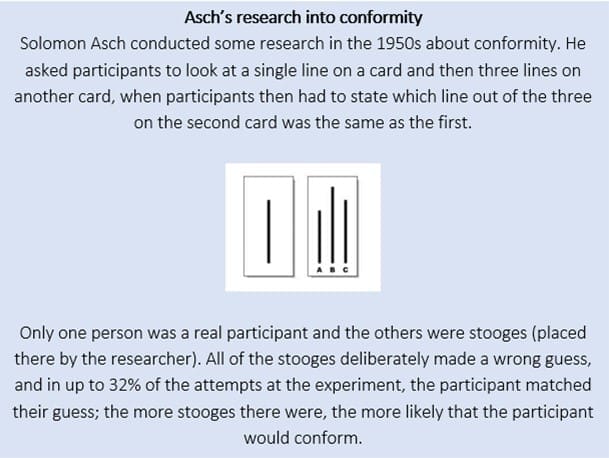In this post
Conformity occurs when someone does not know how to react or behave in a particular situation and therefore they refer to the beliefs and behaviours of others in order to guide their own actions. Some people will conform because of the situation in which they find themselves, whilst others will do so based on factors which are personal to them.
Personality affecting conformity
Locus of control refers to how much a person feels that they have responsibility for their own behaviour, and locus of control can be either internal or external.
- Internal locus of control: if someone feels that they are in control of their own behaviour, they are said to have an internal locus of control. This means that, for example, if someone were to be successful at a job interview, they would believe this happened because they had prepared well and had all the skills relevant for the job. A person with an internal locus of control is less likely to be influenced by other people, meaning that they will be less likely to conform.
- External locus of control: an external locus of control means that an individual believes that they do not have control over their behaviour. In the job example from above, someone with an external locus of control would believe that they were successful because the interviewer was in a good mood or they were lucky with the questions that they were asked. This type of person is more likely to conform because they are much more influenced by the behaviour of other people.
Situational factors affecting conformity
- The size of the majority: not surprisingly, if a person is surrounded by a large group of people who are all behaving in a certain way, they are more likely to behave in the same way themselves.

- Level of agreement of the majority: if the majority is unanimous in their agreement about something, then someone is more likely to conform. For example, if, in a group of friends, some become political activists and some do not, the person may refrain from joining in. If they all become political activists then the person is highly likely to conform and join in
- Difficulty or ambiguity of the task: if a task is very difficult or its instructions are not clear then someone is much more likely to look to other people to find the correct answer. This is referred to as informational social influence because we look to other people for the correct information. Asch found that rates of conformity were higher when the three lines presented were much more similar in length to the original one and therefore where the answer was not as clear.



